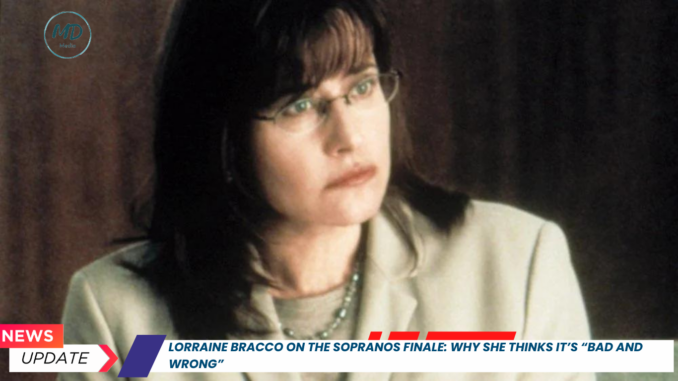
When it comes to television series finales, few have sparked as much debate as The Sopranos. Since its infamous 2007 cut-to-black ending, fans and critics alike have dissected every moment, trying to make sense of what happened to Tony Soprano. Recently, Lorraine Bracco, who portrayed Dr. Jennifer Melfi, Tony’s therapist, weighed in on the controversy, calling the ending “bad and wrong.” Let’s dive into her thoughts and the implications of that shocking finale.
The Controversial Ending Explained
The finale of The Sopranos left viewers on the edge of their seats—or perhaps on the edge of their couches. The final scene shows Tony sitting in a diner, waiting for his family. As the door opens, we see a figure enter, but before we can find out who it is, the screen abruptly cuts to black. This bold move has left many fans feeling frustrated and confused.
Bracco’s character, Melfi, shared a complicated relationship with Tony, who was both her patient and a mob boss. Their journey over the series was intense, layered with psychological tension. Yet, in the finale, Melfi’s storyline is abruptly tied up when she decides to cut ties with Tony after her colleagues uncover his true identity.
Bracco expressed her annoyance with this ending: “How do you invest five years into someone’s life and just walk away? That is not cool.” It’s a sentiment that resonates with many fans who felt similarly robbed of closure.
Lorraine Bracco’s Take on Tony and Melfi
So, what does Bracco believe happened after that fateful diner scene? In a conversation on SiriusXM’s “The Spotlight With Jessica Shaw,” she shared her theory: “Honestly, I think they bumped into each other in restaurants and stuff like that. I think part of me wants to believe that she took a moment away from him, and they got back together, back in therapy. I could believe that.”
This idea of a future meeting hints at hope, suggesting that Melfi and Tony might still have had a connection worth exploring. Fans often wonder about the lives of characters post-finale, and Bracco’s take offers a glimmer of potential reconciliation.
But while Bracco holds onto this belief, she’s clear about her feelings on the finale itself. “I was also not very happy the way David ended it,” she reiterated. Her frustration underscores a common critique of series finales: when you invest time and emotion into a show, you want to feel satisfied by the conclusion.
David Chase’s Perspective: What Was He Thinking?
David Chase, the creator of The Sopranos, has often been enigmatic about his choices. In a 2015 interview, he explained that he never anticipated the intense debate the ending would ignite. “I thought the ending would be somewhat jarring, sure,” he remarked. “But not to the extent it was.”
Chase described his intention behind the abrupt black screen: “I never considered the black a shot. I just thought what we see is black.” For him, it was more about the feeling of life and death, the inevitability of both, and the importance of not losing hope.
He emphasized a key message: “Don’t stop believing.” This was not just a catchphrase but a philosophy he wanted to impart to viewers. In his view, the relationships we forge, even if they end, are meaningful. “Life is short. Either it ends here for Tony or some other time. But in spite of that, it’s really worth it,” he concluded.
The Impact of the Ending on Fans
The ending of The Sopranos has sparked countless discussions and analyses. Fans have interpreted the cut-to-black moment in various ways: some view it as Tony’s impending death, while others see it as a metaphor for life’s uncertainties. This lack of consensus only adds to the series’ mystique and keeps fans engaged years later.
Bracco’s candid remarks shed light on the emotional investment viewers had in the characters. It’s not just about the plot; it’s about the relationships and the connections we form as we watch these stories unfold.
Theories and Speculations
With so much ambiguity, fans have speculated endlessly about what might have happened next. Did Tony survive? Was the diner scene his last moment? Would he have returned to therapy with Melfi? These questions fuel discussions across forums, podcasts, and fan gatherings, showcasing the enduring legacy of the show.
The Fanbase’s Response
The series finale not only polarized viewers but also created a community of passionate fans. Many have come together to share their interpretations and theories, proving that even a divisive ending can bring people together. Bracco’s insights resonate deeply within this community, giving them a voice in the ongoing conversation.
Why Do We Care About Closure?
Bracco’s frustration with the ending highlights a universal truth about storytelling: we crave closure. When we invest time in a narrative, we hope to see characters evolve, resolve conflicts, and achieve some sense of peace. The Sopranos left many wanting, and that’s part of why it remains a hot topic in popular culture.
Closure provides a sense of completion. It allows us to reflect on what we’ve experienced alongside the characters. In Tony and Melfi’s case, their journey was rich with complexity, and the abrupt ending feels like an unresolved chord in a beautiful symphony.
Conclusion: The Legacy of The Sopranos
Lorraine Bracco’s critique of The Sopranos finale speaks volumes about the emotional depth of the series. It’s not just about Tony Soprano; it’s about the bonds we form with characters over time. While David Chase intended to leave audiences with a sense of ambiguity and hope, Bracco’s perspective reminds us that viewers often want resolution and a sense of closure.
The debates surrounding the ending continue to thrive, allowing fans to explore their feelings and interpretations. It’s this very complexity that cements The Sopranos as a landmark in television history—an exploration of life, relationships, and the struggles we all face.
